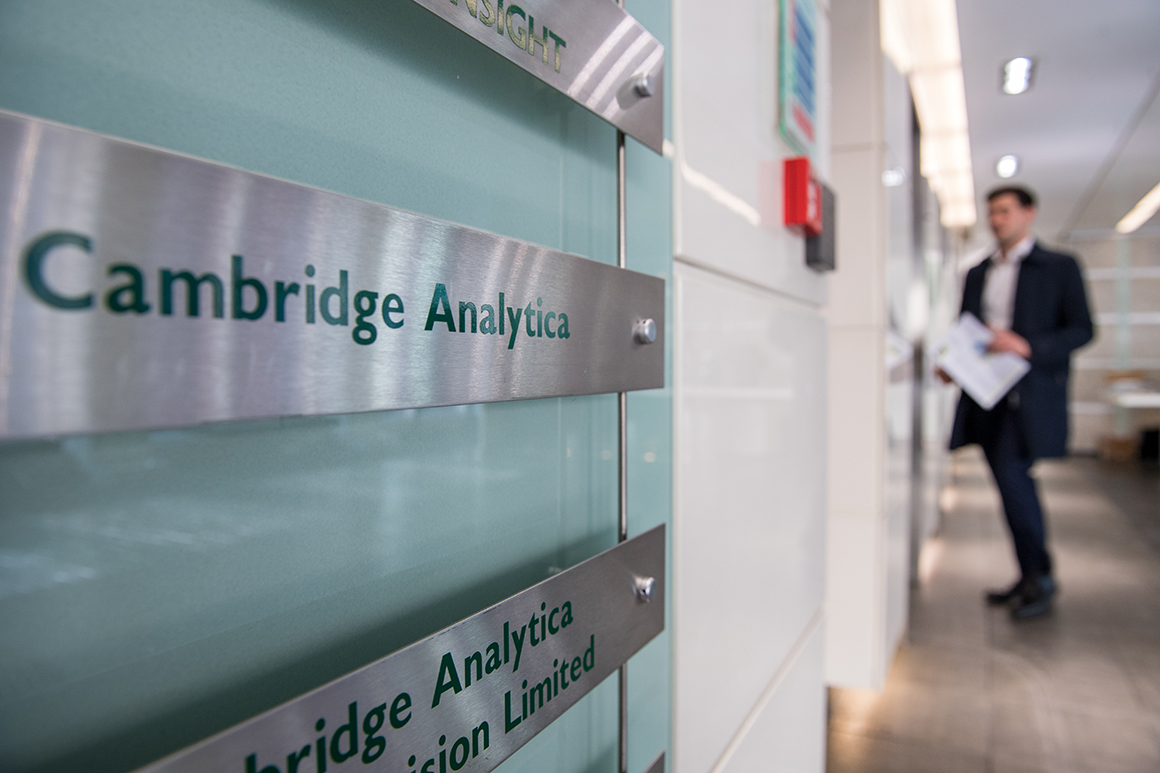
Trump aides have long denied they used Cambridge’s Facebook data in 2016 and say they won’t in 2020, either. And they insist they have no interest in using psychographic voter targeting, a centerpiece of Cambridge’s approach. But that hasn’t allayed fears among Democrats that the president will resort to online dirty tricks to win another White House term.
Elizabeth Warren has lashed out at Facebook for refusing to police Trump’s advertising on the platform. And last week, former President Barack Obama tweeted out a recent article in The Atlantic examining the Trump campaign’s online operation.
„Even if the methods are new, sowing the seeds of doubt, division, and discord to turn Americans against each other is an old trick,“ Obama wrote.
Cambridge shut down in 2018 amid allegations that it set up a scheme to obtain data from nearly 90 million unwitting Facebook users — something the social media platform would eventually describe as a “scam” and a “fraud.”
The firm also drew damaging headlines after it was revealed that Cambridge CEO Alexander Nix reached out to Wikileaks founder Julian Assange in 2016 to help him distribute Hillary Clinton’s emails.
Neither Oczkowski nor the Trump campaign would comment for this article.
The 31-year-old Oczkowski, who specializes in data and behavioral science, is expected to spend most of his time working for the campaign out of San Antonio, where he resides. People familiar with the hire say he will devote his time to data-focused projects like determining where Trump and surrogates ought to campaign in person, figuring out which states are the best targets on Trump’s path to victory, and targeting media buys.
Oczkowski has privately said he plans on using traditional data modeling rather than psychographics, the targeting of voters based upon their personality or behavior.
Oczkowski signed on with Cambridge in 2015, after spending nearly three years working as chief digital officer for Wisconsin Gov. Scott Walker. As one of around a dozen Cambridge employees dispatched to the Trump campaign’s San Antonio outpost, Oczkowski played a key role in constructing what became known as Project Alamo, a massive online campaign — much of it orchestrated through Facebook advertising — that helped to propel Trump to the White House.
The U.K.-based Cambridge assisted Ted Cruz early in the 2016 campaign but began working for Trump once he emerged from the Republican primary. The ties between the data firm and Trumpworld ran deep. Steve Bannon, a onetime Cambridge board member, eventually became Trump’s chief strategist. Trump mega-donor Robert Mercer was also a major funder of the firm.
While many in Trumpworld were skeptical of Cambridge’s psychographics-focused approach, they felt that employees such as Oczkowski could be helpful, with his digital and data experience under Walker making him valuable to the Trump campaign.
But in the aftermath of the 2016 election, Cambridge’s role in the Trump campaign became a matter of dispute. Alexander Nix, the firm’s CEO, was caught on an undercover video bragging that, „we did all the research, all the data, all the analytics, all the targeting, we ran all the digital campaign, the television campaign, and our data informed all the strategy.“
The president’s team — and even some within Cambridge — felt that Nix far overstated the firm’s role with Trump. Trump campaign manager Brad Parscale, who as 2016 digital director spearheaded Project Alamo, called Nix’s claims “so incredibly false and ridiculous.”
Parscale has also been complimentary of some aspects of Cambridge’s work in 2016. During a post-election conference sponsored by Google, he said the company produced polling and data modeling that helped to guide decision-making. But in a 2017 interview with 60 Minutes, Parscale said the use of psychographics wasn’t effective.
Reached by phone, Nix declined to comment on the extent of the firm’s work for Trump’s 2016 campaign.
“You should ask the Trump team about that,” he said.
Oczkowski left Cambridge in March 2017 and became an independent consultant before joining the marketing agency Cloud Commerce. Oczkowski has said that he never used or saw the Facebook data Cambridge allegedly obtained by improper means, which happened prior to his arrival at the firm.
Oczkowski has also said that he didn’t have prior knowledge of Nix’s contact with Assange. And he has strenuously denied that psychographics played a role in Trump’s 2016 campaign.
“I don’t want to break your heart,” Oczkowski said in the Google post-election conference, “but we actually really didn’t do any psychographics for the Trump campaign.”
Source: politico.com
See more here: news365.stream






